Cultivating New Voices among Scholars of Color
Two years of support, mentoring, and networking opportunities for early career scholars of color.
CNV Fellows 2024–2026
The NCTE Research Foundation’s Cultivating New Voices among Scholars of Color (CNV) program is designed to provide two years of support, mentoring, and networking opportunities for early career scholars of color. The program aims to work with doctoral candidates and early career postsecondary faculty of color to cultivate the ability to draw from their own cultural and linguistic perspectives as they conceptualize, plan, conduct, write, and disseminate findings from their research. The program provides socialization into the research community and interaction with established scholars whose own work can be enriched by their engagement with new ideas and perspectives. Learn more about the 2024–2026 fellows below.
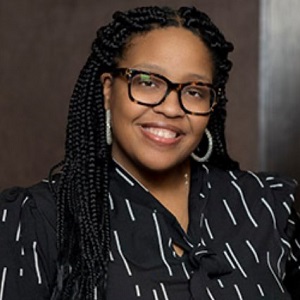 Janice Baines is a clinical instructor in Columbia, SC. She holds a BA from Benedict College, an MEd from the University of Wisconsin, and is a PhD candidate at the University of South Carolina. She coauthored the book, We’ve Been Doing It Your Way Long Enough: Choosing the Culturally Relevant Classroom. She has also coauthored articles and books. Her teaching and research focus on culturally relevant and sustaining pedagogies from an African Diaspora literacy stance. She has a long history working with the National Council of Teachers of English (NCTE), including numerous presentations, serving on NCTE’s Research Foundation, and receiving NCTE’s Early Career Educator of Color Leadership award in 2011. Her classroom work inspired NCTE’s Professional Dyads and Culturally Relevant Teaching initiative. Besides presenting for NCTE, her program contributions include presenting at Multicultural Education Conference, Sankofa, and the Institute for the Study of the African American Child. She also served as a blind assessor under EDUCARE at the University of North Carolina at Chapel Hill. Baines is a two-time participant in the Fulbright Hays Group Projects, which allowed her to study connections between African and African American history, culture, and language while traveling to Sierra Leone (2011) and Ghana (2018). Most recently, she earned Teacher of the Year at Bradley Elementary School in Columbia, SC, obtained her SC Read to Succeed Literacy Teacher Endorsement participated in the Richland One School District Model Teacher program, and served as a model teacher at the Center for the Education and Equity of African American Students.
Janice Baines is a clinical instructor in Columbia, SC. She holds a BA from Benedict College, an MEd from the University of Wisconsin, and is a PhD candidate at the University of South Carolina. She coauthored the book, We’ve Been Doing It Your Way Long Enough: Choosing the Culturally Relevant Classroom. She has also coauthored articles and books. Her teaching and research focus on culturally relevant and sustaining pedagogies from an African Diaspora literacy stance. She has a long history working with the National Council of Teachers of English (NCTE), including numerous presentations, serving on NCTE’s Research Foundation, and receiving NCTE’s Early Career Educator of Color Leadership award in 2011. Her classroom work inspired NCTE’s Professional Dyads and Culturally Relevant Teaching initiative. Besides presenting for NCTE, her program contributions include presenting at Multicultural Education Conference, Sankofa, and the Institute for the Study of the African American Child. She also served as a blind assessor under EDUCARE at the University of North Carolina at Chapel Hill. Baines is a two-time participant in the Fulbright Hays Group Projects, which allowed her to study connections between African and African American history, culture, and language while traveling to Sierra Leone (2011) and Ghana (2018). Most recently, she earned Teacher of the Year at Bradley Elementary School in Columbia, SC, obtained her SC Read to Succeed Literacy Teacher Endorsement participated in the Richland One School District Model Teacher program, and served as a model teacher at the Center for the Education and Equity of African American Students.
Mentor: Allison Skerrett, University of Texas at Austin
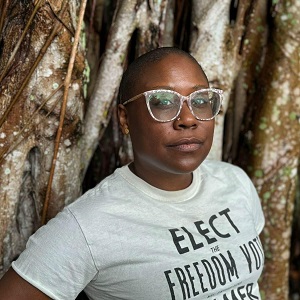 monét cooper is a poet, teacher-educator, and doctoral candidate from Mvskoke land (Decatur, Georgia) in the University of Michigan’s Joint Program in English and Education. A former middle and high school English teacher, she received her bachelor’s in journalism from the University of Georgia, and her master’s in African American Studies from Boston University. In her research, cooper uses poetics of ethnography, interiority, and attention to study Black trans and queer girls’ and femme youths’ literacies as the practice of freedom in their learning spaces, contemplating how possibility for abolition and liberation emerges from everyday messiness, pleasure, desire, and celebration. She is also working on a project exploring how her mom and other Black school children’s out-of-school literacy practices in Georgia made space for self-regard during segregation and desegregation. She is the recipient of fellowships, awards, and residencies from the National Council of Teachers of English, American Educational Research Association, Imagining America, the Conference on College Composition and Communication, and the Hurston-Wright Foundation. cooper cohosts Dancing on Desks, a podcast that celebrates justice-full, liberatory, and abolitionist education. And she always welcomes naps, porch sits, and night talks with her ancestors.
monét cooper is a poet, teacher-educator, and doctoral candidate from Mvskoke land (Decatur, Georgia) in the University of Michigan’s Joint Program in English and Education. A former middle and high school English teacher, she received her bachelor’s in journalism from the University of Georgia, and her master’s in African American Studies from Boston University. In her research, cooper uses poetics of ethnography, interiority, and attention to study Black trans and queer girls’ and femme youths’ literacies as the practice of freedom in their learning spaces, contemplating how possibility for abolition and liberation emerges from everyday messiness, pleasure, desire, and celebration. She is also working on a project exploring how her mom and other Black school children’s out-of-school literacy practices in Georgia made space for self-regard during segregation and desegregation. She is the recipient of fellowships, awards, and residencies from the National Council of Teachers of English, American Educational Research Association, Imagining America, the Conference on College Composition and Communication, and the Hurston-Wright Foundation. cooper cohosts Dancing on Desks, a podcast that celebrates justice-full, liberatory, and abolitionist education. And she always welcomes naps, porch sits, and night talks with her ancestors.
Mentor: Lauren Leigh Kelly, Rutgers University, New Jersey
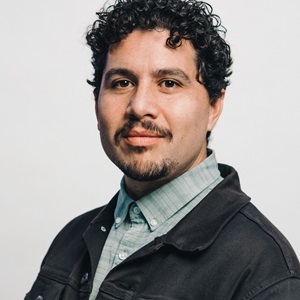 Alex Feliciano Mejía (he/they) is an educator, artist, and researcher focusing on the experiences of communities impacted by racial capitalism, with a focus on the everyday forms of creativity, ingenuity, and solidarity that racialized working class communities engage in. Mejía works across essayistic, poetic, and time-based media including video, film, sound, and book arts. His research methodology is informed by ethnographic and qualitative approaches to the study of language and pedagogy, and he extends these traditions through the incorporation of creative inquiry that draws on his interdisciplinary arts practice. Mejía’s work has been showcased in exhibitions, galleries, and film festivals, and published in scholarly journals and literary anthologies. Working as an assistant professor of critical literacy at San Francisco State’s Department of Secondary Education, Mejía’s teaching focuses on two areas: arts-based approaches to critical literacy and discourse analytic approaches to linguistic practice. Both of these areas of teaching support middle school and high school teachers to draw on their own sources of linguistic and creative practice as foundations for pedagogical and curricular design. In addition to teaching at SF State, Mejía is also an MFA candidate in the creative writing department, working at the intersection of creative writing and experimental cinema.
Alex Feliciano Mejía (he/they) is an educator, artist, and researcher focusing on the experiences of communities impacted by racial capitalism, with a focus on the everyday forms of creativity, ingenuity, and solidarity that racialized working class communities engage in. Mejía works across essayistic, poetic, and time-based media including video, film, sound, and book arts. His research methodology is informed by ethnographic and qualitative approaches to the study of language and pedagogy, and he extends these traditions through the incorporation of creative inquiry that draws on his interdisciplinary arts practice. Mejía’s work has been showcased in exhibitions, galleries, and film festivals, and published in scholarly journals and literary anthologies. Working as an assistant professor of critical literacy at San Francisco State’s Department of Secondary Education, Mejía’s teaching focuses on two areas: arts-based approaches to critical literacy and discourse analytic approaches to linguistic practice. Both of these areas of teaching support middle school and high school teachers to draw on their own sources of linguistic and creative practice as foundations for pedagogical and curricular design. In addition to teaching at SF State, Mejía is also an MFA candidate in the creative writing department, working at the intersection of creative writing and experimental cinema.
Mentor: Renee Moreno, California State University, Northridge
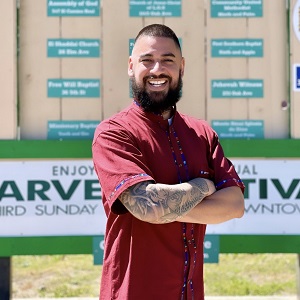 Rubén González, proudly from Greenfield, California, is a PhD candidate in race, inequality, and language in education at Stanford University, where he also earned a Master of Arts degree in sociology. His research explores how students and teachers of color develop, sustain, and enact a critical sociopolitical disposition in classroom, school, and larger community settings. González’s dissertation is a two-year ethnographic and qualitative study of how four novice English language arts teachers of color (two elementary teachers and two high school teachers) develop and enact an abolitionist praxis during their preservice and first-year teaching experiences. This research has been supported by the Ford Predoctoral Fellowship and the NAEd/Spencer Dissertation Fellowship.
Rubén González, proudly from Greenfield, California, is a PhD candidate in race, inequality, and language in education at Stanford University, where he also earned a Master of Arts degree in sociology. His research explores how students and teachers of color develop, sustain, and enact a critical sociopolitical disposition in classroom, school, and larger community settings. González’s dissertation is a two-year ethnographic and qualitative study of how four novice English language arts teachers of color (two elementary teachers and two high school teachers) develop and enact an abolitionist praxis during their preservice and first-year teaching experiences. This research has been supported by the Ford Predoctoral Fellowship and the NAEd/Spencer Dissertation Fellowship.
Prior to his graduate studies, González was a high school English, English language development, and AVID teacher in Sacramento, California. As a high school teacher, he cofounded and coadvised the Social Justice & Equity Collective (SJEC), an after-school and student-led organizing and activist space. González also worked with (im)migrant and multilingual Latinx youth as an academic tutor in classroom and after-school settings during his undergraduate studies. He completed his Bachelor of Arts degree in English at Sacramento State University after transferring from Hartnell College.
Mentor: Tracey Flores, University of Texas at Austin
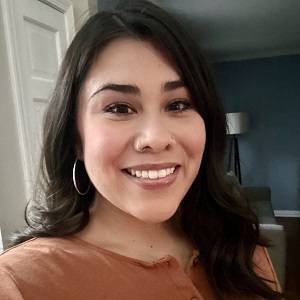 Adrianna González Ybarra is a doctoral candidate at the University of Missouri (MU) in the language and literacies for social transformation program. She is a Gus T. Ridgel and Sharon Adair Cinelli Fellow at MU. Ybarra earned a BS in Community Health and Latina/o studies from the University of Illinois at Urbana Champaign, and an MS degree in Mexican American Studies at the University of Arizona. Ybarra’s educational training in ethnic studies, alongside her identity as a third-generation Mexican American and first-generation college graduate, guide her research practices, frameworks, and worldviews, whereby she draws from her own familial and ancestral knowledge(s), memories, and stories, to guide her work. Her research focuses on the schooling experiences of students and preservice teachers of color to directly inform humanizing literacy research, theory, and practice. Theoretically, she draws upon critical race theories and Women of Color feminisms, and methodologically, she utilizes decolonial methodologies and testimonio to story their lived experiences, knowledges, and language and literacy practices. Her dissertation work takes a collaborative research approach to analyze how Women of Color preservice teachers at a Hispanic serving institution cocreate an affinity group to share their stories and ways of knowing and being in the world.
Adrianna González Ybarra is a doctoral candidate at the University of Missouri (MU) in the language and literacies for social transformation program. She is a Gus T. Ridgel and Sharon Adair Cinelli Fellow at MU. Ybarra earned a BS in Community Health and Latina/o studies from the University of Illinois at Urbana Champaign, and an MS degree in Mexican American Studies at the University of Arizona. Ybarra’s educational training in ethnic studies, alongside her identity as a third-generation Mexican American and first-generation college graduate, guide her research practices, frameworks, and worldviews, whereby she draws from her own familial and ancestral knowledge(s), memories, and stories, to guide her work. Her research focuses on the schooling experiences of students and preservice teachers of color to directly inform humanizing literacy research, theory, and practice. Theoretically, she draws upon critical race theories and Women of Color feminisms, and methodologically, she utilizes decolonial methodologies and testimonio to story their lived experiences, knowledges, and language and literacy practices. Her dissertation work takes a collaborative research approach to analyze how Women of Color preservice teachers at a Hispanic serving institution cocreate an affinity group to share their stories and ways of knowing and being in the world.
Mentor: Jamila Lyiscott, University of Massachusetts Amherst
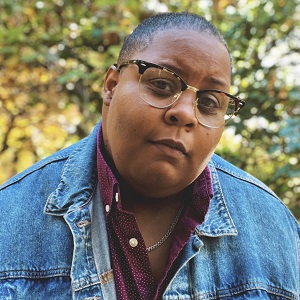 shea wesley martin is a literacy educator and doctoral candidate in adolescent, post-secondary, and community literacies at The Ohio State University. Their dissertation explores how geography, sociopolitical context, and histories impact Black LGBTQIA+ youth’s literacies in the Deep South. Before beginning their doctoral studies, martin taught middle and high school English in Florida and Massachusetts and cofounded/facilitated several initiatives to support LGBTQIA+ youth and educators around the country. Through their work, they aim to bridge the gaps between the “scholarly,” community efforts, and literacy classrooms. martin was awarded The Konigsberg Award from the Assembly on Literature for Adolescents of NCTE (ALAN) in 2022 and the NCTE LGBTQIA+ Advocacy & Leadership Award in 2023. Their work appears in multiple scholarly and creative outlets, including Research on Diversity in Youth Literature, Radical Teacher, and Electric Literature. Above all, they are committed to doing whatever it takes to help Black queer and trans kids get free on the page, in this world, and beyond.
shea wesley martin is a literacy educator and doctoral candidate in adolescent, post-secondary, and community literacies at The Ohio State University. Their dissertation explores how geography, sociopolitical context, and histories impact Black LGBTQIA+ youth’s literacies in the Deep South. Before beginning their doctoral studies, martin taught middle and high school English in Florida and Massachusetts and cofounded/facilitated several initiatives to support LGBTQIA+ youth and educators around the country. Through their work, they aim to bridge the gaps between the “scholarly,” community efforts, and literacy classrooms. martin was awarded The Konigsberg Award from the Assembly on Literature for Adolescents of NCTE (ALAN) in 2022 and the NCTE LGBTQIA+ Advocacy & Leadership Award in 2023. Their work appears in multiple scholarly and creative outlets, including Research on Diversity in Youth Literature, Radical Teacher, and Electric Literature. Above all, they are committed to doing whatever it takes to help Black queer and trans kids get free on the page, in this world, and beyond.
Mentor: Stephanie Anne Shelton, University of North Carolina at Chapel Hill
 Mohit Mehta has over twenty years of teaching experience in India, Guatemala, Nicaragua, Palestine and in multilingual classrooms in Texas. His dissertation research focuses on the language and literacy practices of Asian American adolescents at the intersection of multimodality and racial literacy. Since 2021, Mehta has been advocating for Asian American ethnic studies in Texas at the local, state, and national levels; co-organized the first Asian American studies course in a Texas high school; and designed the first statewide professional development for K–12 teachers in Asian American studies. He believes we have a deep, ongoing commitment to our communities and ancestors for fighting for multiple forms of justice, including racial and linguistic justice.
Mohit Mehta has over twenty years of teaching experience in India, Guatemala, Nicaragua, Palestine and in multilingual classrooms in Texas. His dissertation research focuses on the language and literacy practices of Asian American adolescents at the intersection of multimodality and racial literacy. Since 2021, Mehta has been advocating for Asian American ethnic studies in Texas at the local, state, and national levels; co-organized the first Asian American studies course in a Texas high school; and designed the first statewide professional development for K–12 teachers in Asian American studies. He believes we have a deep, ongoing commitment to our communities and ancestors for fighting for multiple forms of justice, including racial and linguistic justice.
Mentor: Cati de los Ríos, University of California, Berkeley
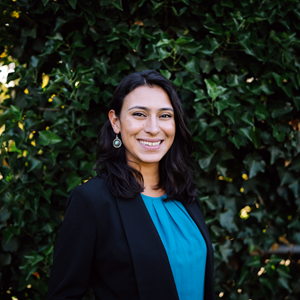 Cristina S. Méndez (she/ella) is a Chicana educator, scholar, and poet. She is a doctoral candidate at the University of California, Berkeley School of Education and a member of the interdisciplinary designated emphasis program in Indigenous language revitalization. Her research focuses on the lived experiences and sense making of Maya Mam women lideresas who organize for the vitality of their language and culture and for the well-being of their communities across the United States, México, and Guatemala. Through her research and other collaborations, Méndez is committed to centering Indigenous, feminist, and decolonial epistemologies and methodologies. In this line, Méndez engages in collaborative research with Mam community members on designing pedagogical resources for language reclamation. Méndez examines how revitalization movements offer the potential for coalition-building and pedagogical innovations for a decolonial future. Formerly, Méndez was a proud elementary school teacher and worked in preschools across California’s Central Valley and Bay Area regions. She received her BA in rhetoric with a minor in education from UC Berkeley and her MA in urban education from Loyola Marymount University.
Cristina S. Méndez (she/ella) is a Chicana educator, scholar, and poet. She is a doctoral candidate at the University of California, Berkeley School of Education and a member of the interdisciplinary designated emphasis program in Indigenous language revitalization. Her research focuses on the lived experiences and sense making of Maya Mam women lideresas who organize for the vitality of their language and culture and for the well-being of their communities across the United States, México, and Guatemala. Through her research and other collaborations, Méndez is committed to centering Indigenous, feminist, and decolonial epistemologies and methodologies. In this line, Méndez engages in collaborative research with Mam community members on designing pedagogical resources for language reclamation. Méndez examines how revitalization movements offer the potential for coalition-building and pedagogical innovations for a decolonial future. Formerly, Méndez was a proud elementary school teacher and worked in preschools across California’s Central Valley and Bay Area regions. She received her BA in rhetoric with a minor in education from UC Berkeley and her MA in urban education from Loyola Marymount University.
Mentor: Susi Long, University of South Carolina, Columbia
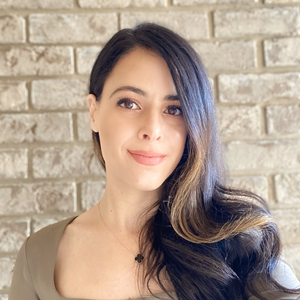 Rashida Mustafa is a doctoral candidate in the English education program at Teachers College, Columbia University. After receiving her BA in English literature and an MA in education from Cleveland State University, Mustafa taught first-year composition courses at her alma mater for five years. After moving to New York City to pursue her PhD, Mustafa began teaching MA courses in the English education program at Teachers College as well as first-year writing courses at Marymount Manhattan College.
Rashida Mustafa is a doctoral candidate in the English education program at Teachers College, Columbia University. After receiving her BA in English literature and an MA in education from Cleveland State University, Mustafa taught first-year composition courses at her alma mater for five years. After moving to New York City to pursue her PhD, Mustafa began teaching MA courses in the English education program at Teachers College as well as first-year writing courses at Marymount Manhattan College.
Mustafa’s research critically explores historical, social, and political implications on Palestinian-American adolescent identity developments and perceptions of self. By using Palestinian-authored literature, Mustafa hopes their reading transactions will explain how they express their identity at home and in their school communities.
Mustafa’s concern for Palestinian American adolescent literacy was catapulted by the advocacy on Columbia University’s campus during the spring 2024 encampments. Inspired by her peers’ commitments to social justice, Mustafa presented her reflections on the campus encampments at the Dialogical Self Theory conference in Estonia. She also presented her findings on the identity negotiations of Palestinian American adolescents and ways teachers can use this context to be proactive in creating equitable and critical ELA curriculums that could affirm and validate their Palestinian American students’ identity.
Mentor: E. Sybil Durand, University of Arizona, Tucson
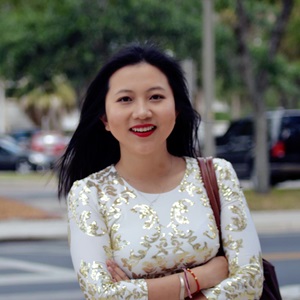 Tairan Qiu is a mother, daughter, wife, teacher, writer, and scholar. She works as an assistant professor of literacy eEducation at the University of Houston. Qiu grew up in Kunming, China, and is a first-generation (im)migrant in the United States. As a transnational migrant and Asian woman, Qiu’s research is at the intersection of language, literacy, culture, race, and transnationalism. Her research agenda is oriented around exploring transnational youth’s dynamic language and literacy practices and centering their stories and experiences to shape research-informed advocacy in their schools, communities, and homes and sustain their whole cultural, linguistic, and literacies repertoire. Her scholarship has appeared in journals such as Qualitative Inquiry, Equity & Excellence in Education, International Journal of Qualitative Studies in Education, Written Communication, and the Journal of Language and Literacy Education. She is a 2023–2025 Reading Hall of Fame Emerging Scholar Fellowship Fellow.
Tairan Qiu is a mother, daughter, wife, teacher, writer, and scholar. She works as an assistant professor of literacy eEducation at the University of Houston. Qiu grew up in Kunming, China, and is a first-generation (im)migrant in the United States. As a transnational migrant and Asian woman, Qiu’s research is at the intersection of language, literacy, culture, race, and transnationalism. Her research agenda is oriented around exploring transnational youth’s dynamic language and literacy practices and centering their stories and experiences to shape research-informed advocacy in their schools, communities, and homes and sustain their whole cultural, linguistic, and literacies repertoire. Her scholarship has appeared in journals such as Qualitative Inquiry, Equity & Excellence in Education, International Journal of Qualitative Studies in Education, Written Communication, and the Journal of Language and Literacy Education. She is a 2023–2025 Reading Hall of Fame Emerging Scholar Fellowship Fellow.
Qiu serves the field as the co-chair of the Multilingual and Transnational ICG of Literacy Research Association, co-chair of the Language and Social Processes SIG Mentoring Committee of American Educational Research Association, and a committee member of NCTE’s Promising Young Writers Advisory Committee. Before becoming a professor, Qiu taught seventh- and eighth-grade ELA and K–adult ESOL.
Mentor: Betina Hsieh, University of Washington, Seattle
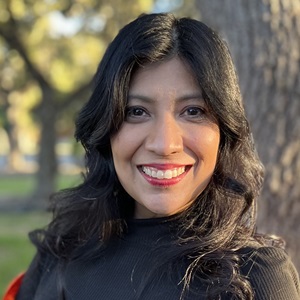 Yvette M. Regalado, PhD, brings over 14 years of experience in the K–12 field, specializing in reading and dyslexia coordination, to her role as a curriculum and instruction professor at Texas State University and a curriculum and instruction director for Catch the Next, a nonprofit. Alongside her academic endeavors, she collaborates with the community, facilitating Coahuiltecan language and Ways of Knowing classes and serves as an educator in the Tānko Institute: Xinachtli Pedagogy. Dr. Regalado is dedicated to revitalizing Indigenous languages and cultures in collaboration with the Indigenous Cultures Institute. Her work creates counterspaces that promote a sense of belonging and unity.
Yvette M. Regalado, PhD, brings over 14 years of experience in the K–12 field, specializing in reading and dyslexia coordination, to her role as a curriculum and instruction professor at Texas State University and a curriculum and instruction director for Catch the Next, a nonprofit. Alongside her academic endeavors, she collaborates with the community, facilitating Coahuiltecan language and Ways of Knowing classes and serves as an educator in the Tānko Institute: Xinachtli Pedagogy. Dr. Regalado is dedicated to revitalizing Indigenous languages and cultures in collaboration with the Indigenous Cultures Institute. Her work creates counterspaces that promote a sense of belonging and unity.
Grounded in her identity as an Indigenous Latina practitioner-scholar-activist, Dr. Regalado is deeply committed to advancing cultural and language pedagogy in literacy instruction. She advocates for multilingual learners, supports racial literacy development, and champions antiracist and social justice-focused restorative literacy pedagogical practices. Her research focuses on disrupting and dismantling the educational deficit narratives surrounding BIPOC students in K–16 classrooms. She amplifies their voices, validates their experiences, and works to create more equitable postsecondary environments. Additionally, her research advocates for underrepresented BIPOC practitioners in community colleges through counterstorytelling, contributing to broader efforts to address systemic educational inequalities.
Mentor: Melody Zoch, University of North Carolina at Greensboro
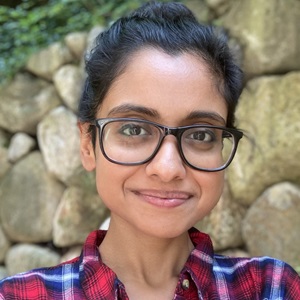 Ankhi G. Thakurta is an assistant professor in the Teaching, Curriculum, and Society Department at the Boston College Lynch School of Education and Human Development. A bilingual Indian American immigrant and former middle school English language arts teacher, her current research foregrounds the civic literacies and learning of immigrant, migrant, and refugee youth. She is interested in how these young people use everyday literacy practices (e.g., reading, writing, artmaking) to assert democratic identities and how critical literacy education can foster their sociopolitical engagement and dreaming. As a visual artist, Thakurta also explores how art-infused research methods can be used to conduct liberatory scholarship alongside historically marginalized communities. Her work has been supported by an English Language Arts Teacher Educators (ELATE) Graduate Student Research Award (2021–2022), a National Academy of Education/Spencer Dissertation Fellowship (2022), and other sources.
Ankhi G. Thakurta is an assistant professor in the Teaching, Curriculum, and Society Department at the Boston College Lynch School of Education and Human Development. A bilingual Indian American immigrant and former middle school English language arts teacher, her current research foregrounds the civic literacies and learning of immigrant, migrant, and refugee youth. She is interested in how these young people use everyday literacy practices (e.g., reading, writing, artmaking) to assert democratic identities and how critical literacy education can foster their sociopolitical engagement and dreaming. As a visual artist, Thakurta also explores how art-infused research methods can be used to conduct liberatory scholarship alongside historically marginalized communities. Her work has been supported by an English Language Arts Teacher Educators (ELATE) Graduate Student Research Award (2021–2022), a National Academy of Education/Spencer Dissertation Fellowship (2022), and other sources.
Thakurta holds a BA from Swarthmore College, an EdM from the Harvard Graduate School of Education, an MA from Brooklyn College, and a PhD from the University of Pennsylvania Graduate School of Education. She can be found on X (@AnkhiThakurta) and Instagram (@art_as_method).
Mentor: Qiana Cutts Givens, Mississippi State University
